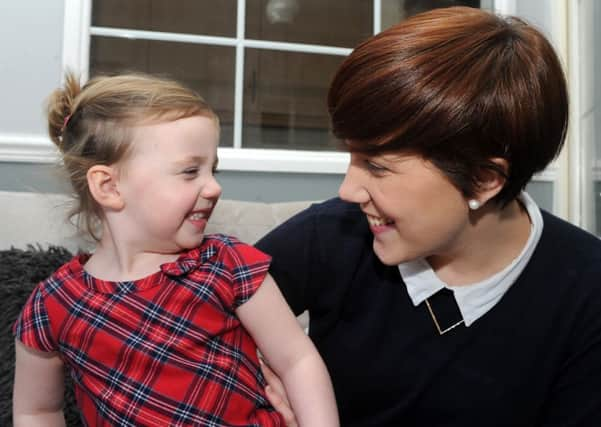Stem treatment ‘gave my life back’


Two years ago Holly Drewry could only dream of walking to the shops with her daughter Isla. Now, thanks to pioneering stem cell treatment in Sheffield, that dream has become reality.
Holly was diagnosed with Multiple Sclerosis when she was just 21.
Advertisement
Hide AdAdvertisement
Hide Ad“I had been back and forth to the GP because I kept getting double vision and numbness in one leg. He said it was common in people my age and to take paracetemol. But I knew something was wrong.”
In the end Holly went to her local walk-in centre and after a few simple neurological tests she was sent straight to the Royal Hallamshire Hospital in Sheffield. And the MRI scan confirmed she was suffering from MS.
“It was ironic really as I had been a carer and cared for people with MS, but I never thought that was what I had, In fact in some ways it was a relief to have a diagnosis as you tend to think the worst.”
Holly was given steroids but then fell pregnant with her daughter Isla and had to come off them.
Advertisement
Hide AdAdvertisement
Hide Ad“I felt fine during my pregnancy but after Isla was born it all went wrong. It got so bad I ended up in a wheelchair. My legs were numb. I lost all my independence. I struggled to even change Isla’s nappy.”
Nothing seemed to help Holly, until her consultant suggested a new stem cell transplant treatment.
“He said it was my last chance so I really didn’t have any choice. I had Isla and my parter Karl to think about.”
The treatment involves “rebooting” the immune system and was developed initially to treat cancers such as leukaemia and lymphoma.
Advertisement
Hide AdAdvertisement
Hide AdMS is a disease of the central nervous system and has no cure. Although no-one understands the exact cause, doctors believe that in susceptible individuals something triggers the immune system to attack the brain and spinal cord, leading to inflammation and degeneration resulting in disability. The new treatment, known as autologous haematopoietic stem cell transplantation (HSCT), aims to reverse this mechanism – destroying the dysfunctional immune system causing the MS with a high dose of chemotherapy. This is then rebuilt with stem cells taken from the patient’s own blood which are harvested and stored before being transplanted back into the patient’s body. The harvested stem cells are then infused back into the body where they grow new blood and bone marrow cells after two to three weeks.
“I knew straight away that it had worked,” says Holly. “I Skyped my mum from hospital and showed her that I could walk unaided and she burst into tears.”
Now Holly is more than capable of looking after two- year-old Isla, she has gone back to work three days a week and can even dance again.
“I am so lucky that this was available on my door step,” says Holly, 25. “I don’t know what the future holds as this is all so new, but I am just enjoying life.”
Advertisement
Hide AdAdvertisement
Hide AdProfessor Basil Sharrack, consultant neurologist at Sheffield Teaching Hospitals NHS Foundation Trust, said: “This treatment is only suitable for patients with relapsing remitting disease who have had two or more significant relapses in the previous twelve months, failed to respond to standard treatment and who had the illness for no more than 10 years.
“This treatment is not effective in in patients with primary or secondary MS. These initial results now need to be confirmed in a larger randomised clinical trial.”
Professor John Snowden, consultant haematologist and director of bone marrow transplantation at Sheffield Teaching Hospitals NHS Foundation Trust said: “The procedure is very similar to what we have used for many years to treat cancers of the blood and bone marrow. We are not using the therapy as a means of regenerating damaged nervous or other tissues.
Instead the procedure is more of an intensive form of “rebooting” the immune system. Across the world over a thousand MS patients have received this treatment, predominantly in continental Europe and North America. International guidelines and recommendations are publically available for patient selection and treatment protocols (www.EBMT.org).
Advertisement
Hide AdAdvertisement
Hide Ad“Where feasible, patients should be enrolled on clinical trials. The Sheffield team has been working closely with international leaders in this field for several years.”
NHS Blood and Transplant collects the stem cells from patients in their Therapeutic Apheresis Unit using a cell separator machine platform.
Catherine Howell, chief nurse of diagnostic and therapeutic services at NHS Blood and Transplant, added: “We are delighted to be supporting this important research and to be working in collaboration with Sheffield Teaching Hospitals NHS Foundation Trust.”
Sheffield Teaching Hospitals NHS Foundation Trust is one of four international sites (and the only UK site) involved in the randomised controlled trial in this area.
n www.clinicaltrials.gov/ct2/show/NCT00273364